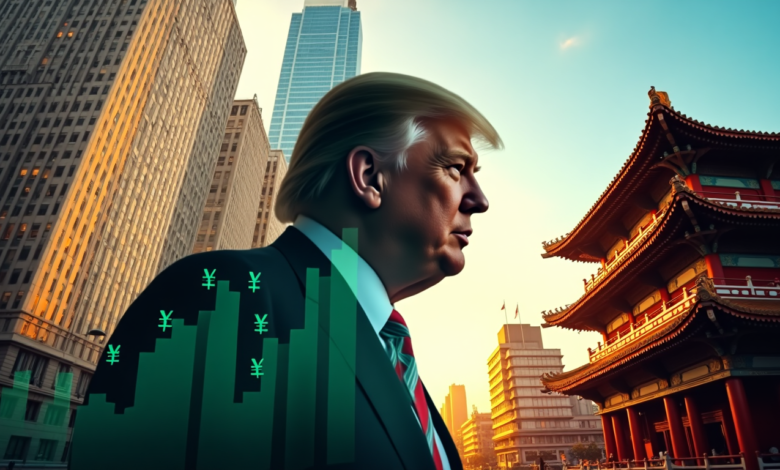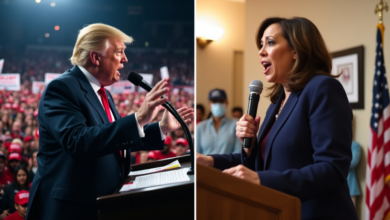
Impact of Trump’s Victory on Wall Street’s China Strategy
Wall Street firms might need to reshape their China plans as Donald Trump’s campaign builds momentum for the 2024 presidential election. The biggest financial institutions are taking a hard look at their Chinese market exposure while they expect tougher policies and more regulatory oversight. A Trump win could fundamentally change how American financial firms do business in the world’s second-largest economy.
These financial powerhouses must get ready for several changes that could shake up their China operations. They worry about new tariffs on Chinese goods, limits on money flows, and China losing its most-favored-nation trading status. The firms also need to think over how these policy changes could affect their Chinese partnerships. Market access and revenue from growing sectors like electric vehicles hang in the balance.
Trump’s Proposed China Policies
Donald Trump’s proposed China policies show a fundamental change in U.S.-China economic relations that could impact global markets deeply. The former president’s campaign platform presents several aggressive measures to reshape how both countries work together.
Tariff increases
Trump has announced plans to implement tariffs exceeding 60% on Chinese imports. This represents a dramatic jump from the 21% peak during his first administration. The proposed tariffs would bring significant changes to the economic landscape:
- Chinese exports could drop by approximately $200 billion
- China’s GDP might face a 1 percentage point decline
- Consumer prices would rise in sectors of all types
- Global supply chains and manufacturing partnerships would need significant restructuring
Ending most-favored-nation status
Trump’s strategy includes a significant plan to revoke China’s permanent normal trade relations (PNTR) status. The United States will no longer provide non-discriminatory treatment to China in their trade dealings. This policy move marks a fundamental transformation in the trading relationship between the world’s two largest economies.
Potential capital flow restrictions
New policy proposals aim to limit U.S. capital flows into China in ways never seen before. These limits could impact investments worth trillions of dollars and speed up the financial split between both countries. The Treasury Department looks at several options that include:
The U.S. government plans tighter control of American investments in key areas like artificial intelligence, quantum computing, and semiconductor technology. These controls match ongoing worries about national security and tech rivalry.
Trump’s economic plans surface while China faces tough times with its struggling real estate sector and weak consumer spending. Financial experts point out that these policies could hit harder now than during Trump’s first term because China’s economy shows signs of weakness.
Wall Street’s Risk Assessment
Major financial institutions now evaluate risks thoroughly as U.S.-China relations become more uncertain. Industry executives and analysts highlight important changes in Wall Street firms’ approach to their Chinese operations. These changes stem from escalating geopolitical tensions between the two nations.
Heightened regulatory scrutiny
Regulatory bodies now closely monitor U.S. financial firms operating in China. Kapronasia’s research director explains that Trump’s predicted hardline approach toward China could create additional regulatory challenges for U.S. financial institutions. Regulators have expanded their focus beyond traditional banking activities and now examine investment movements and mutually beneficial alliances extensively.
Compliance challenges
Wall Street firms face several compliance hurdles in their Chinese operations:
- Chinese authorities impose strict restrictions on capital movement into the country
- Regulatory bodies demand detailed reporting from Chinese business partnerships
- Cross-border transactions involve complex regulatory requirements
- Government agencies maintain rigorous control over technology transfers
Strategies to alleviate risks
Financial institutions now implement protective measures to safeguard their interests. A senior executive at a major U.S. financial firm revealed their organization held multiple risk management meetings to prepare for policy changes. Their strategy moved toward creating “self-sustained” independent operating units in China, and “de-Americanization” became their guiding principle.
Many firms have taken early action. Van Eck abandoned its Chinese expansion plans in 2023, while Vanguard pulled out of its joint venture operations. U.S. law firms’ presence in China has diminished significantly. More than ten firms closed their Chinese offices since last year, and prominent firms like Mayer Brown plan to separate their Hong Kong operations.
Gavekal Dragonomics’ deputy China research director Christopher Beddor points out that Wall Street worries most about Trump’s proposed tariffs and Beijing’s potential response. U.S.-China relations face unprecedented uncertainty, and financial operations could see a wide range of outcomes.
Wall Street firms still see opportunities in Beijing’s push for foreign financial market access. They approach these prospects carefully with strong risk management frameworks in place.
Impact on Financial Firms’ China Operations
U.S. financial institutions have started making the most important operational adjustments to their China business strategies. Donald Trump’s potential return to the White House has created uncertainty, and these institutions now need a detailed review of their presence in the Chinese market amid possible geopolitical tensions.
Signs of Market Retreat and Slower Growth
Major financial firms have started pulling back from their Chinese operations. Van Eck dropped its plans to set up shop in China. Vanguard also stepped away from its joint venture operations in the region. The trend extends beyond finance, as more than ten U.S. law firms have shut down some or all of their China offices. These moves signal a broader shift toward a more cautious approach in the Chinese market.
Self-sustained units
Financial institutions now restructure their Chinese operations to work independently. A senior executive at a major U.S. financial firm shared insights from their risk management meetings. The organization aims to transform their China business into a “self-sustained” independent operating unit. This transformation aligns with their new guiding principle of “de-Americanization” as they prepare for policy changes ahead.
Revenue implications
Wall Street’s earnings from Chinese operations show substantial changes:
- The top five U.S. investment banks – Goldman Sachs, Morgan Stanley, JPMorgan, Bank of America, and Citigroup – earned $454 million from Chinese investment banking in 2024
- Their earnings rose from $276 million in 2023
- But these numbers still fall well below the peak of $1.6 billion in 2020
Tough market conditions and tighter regulatory oversight have pushed revenues down by affecting corporate dealmaking and fundraising. Market experts believe Trump’s proposed policies could squeeze these revenue streams even more. His plans include tariffs that might exceed 60% and new limits on capital movement.
U.S. financial firms worry about Trump’s trade policies. These policies could drive inflation up and keep U.S. interest rates high, which might weaken trading partners’ currencies. American financial institutions working in China could face a harder time in this economic climate.
Broader Economic Implications
Trump’s presidency could trigger a potential change in U.S.-China economic relations. This change threatens to reshape how global trade works. The impact reaches way beyond just these two countries. Economic analysts expect most important adjustments in international trade patterns and market behaviors.
Effects on US-China trade relations
Chinese exports to the U.S. dropped 14% to $500.29 billion in 2023 amid ongoing tensions. The U.S. trade deficit with China decreased to $279.11 billion in 2023 from $346.83 billion in 2016, which suggests a major transformation in trade dynamics. America’s share as an export destination for Chinese goods has fallen below 15%, compared to almost 18% a decade ago.
Potential market volatility
Trump’s victory triggered immediate and most important market reactions:
- The Chinese yuan dropped against the dollar from 7.10 to 7.17
- Investors reduced their Chinese domestic asset holdings by 15% from their 2021 peak
- Foreign direct investment numbers hit record lows
- The Hang Seng Index fell more sharply than mainland indices
Global economic ripple effects
Global trade patterns are changing dramatically. China has shifted its export strategy toward new markets, especially when you have Southeast Asia in the picture. Chinese imports now make up more than 25% of ASEAN imports, compared to 18% a decade ago. The Chinese government plans bold economic moves with a potential stimulus package that could reach 10 trillion yuan over 3-5 years. They aim to use 6 trillion yuan to tackle local government debt and 4 trillion yuan to support the property market.
The People’s Bank of China is ready to ease monetary policy through rate cuts and expanded open market operations to keep financial stability strong. These steps show how Beijing prepares for what it all means from renewed trade tensions. Trade experts point out that while China’s U.S. market share has dropped, it has built a stronger presence in other regions. This shows how the global economy adapts naturally to shifting trade patterns.
Wall Street’s relationship with China faces a crucial turning point as financial institutions adapt to policy changes under Trump’s presidency. Major banks have started to restructure their Chinese operations. They create standalone units and reduce their expansion plans. These strategic moves reflect both current revenue challenges and uncertainty about U.S.-China’s economic future.
Wall Street’s new approach to China points to broader changes in the global financial world. Chinese markets now focus on different trading partners, especially in Southeast Asia. U.S. financial institutions carefully weigh risks against chances in the world’s second-largest economy. These developments show a fundamental change in international financial flows and trading patterns that will continue whatever the political outcome.




